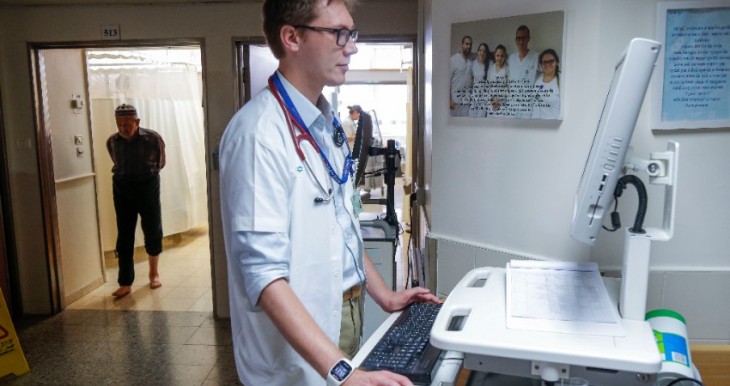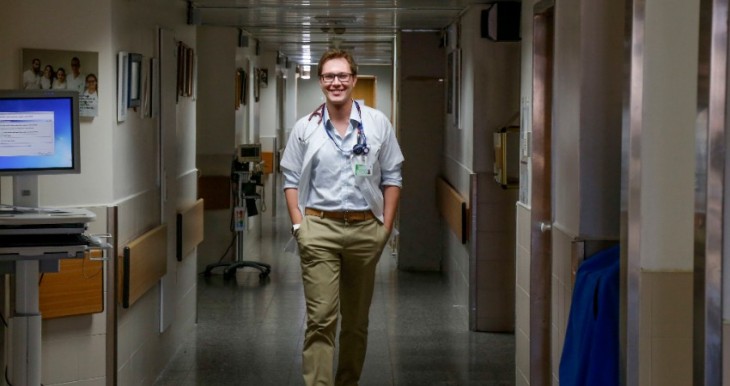Anatoli, who immigrated to Israel in 2012, works in the internal medicine department at Carmel Hospital in Haifa. He arrived from Russia knowing “only knew a few words of Hebrew, almost nothing,” yet thanks to various components of The Jewish Agency’s immigrant absorption assistance, he is now taking his first steps as a doctor in Israel. Both Anatoli and his wife, Sofia, went through the training program for immigrant doctors at the absorption center in Ashdod.
Located throughout Israel, absorption centers are temporary living quarters that provide a soft landing and supportive framework tailored to the needs of olim. The centers’ furnished rooms or apartments are available for rental at substantially lower rates than on the private market, providing new immigrants with a warm atmosphere as they become acquainted with Israeli society. Further, ulpanim (intensive Hebrew classes) are available at most absorption centers and are staffed by highly professional teams who have long-term experience in assisting immigrants.
“Like my wife, I already worked as a doctor in St. Petersburg,” Anatoli says. “She worked in Novosibirsk, and when I got to Israel I was referred to the absorption center in Ashdod. I went through the track in 2012, with a Hebrew ulpan. When I arrived I could only say ‘yes’ and ‘no’ in Hebrew. How is my Hebrew now? When you get down to learning you achieve something. In general, you have to study in order to learn a language and, even if you speak with an accent, the idea is to achieve a good command of the language.”
Anatoli’s doctor’s training course included ulpan A and ulpan B for learning medical terminology in Hebrew.
“In practice, we learned the language and also medicine at the same time,” he says. “It is very difficult because when you give everything to one thing, that comes at the expense of something else. If you don’t want to harm the language and the medicine, you have to put in a lot of work and do a lot of homework. That was the hardest thing—sitting down and studying Hebrew, and also studying for the exam. A high percentage of people from the project I was on tried to do that, and only three passed.”
Anatoli proceeded to an internship at the Beilinson-Rabin Medical Center in Petah Tikva, which lasted one year.
“The greatest thing is that, when someone comes to Israel and they are not familiar with the health system, the internship helps them see what, for example, an internal medicine department is, what a surgical department is, because it is different from the FSU and other places,” he says. “The internship offers them an understanding of what exactly you want to do further on down the road. You get an updated orientation. You see how the health system works, get into it, and it is easier to focus on your own direction.”
Anatoli subsequently joined the IDF in accordance with an agreement between Israel’s Ministry of Defense and Ministry of Immigrant Absorption, in which immigrant men who complete a medical internship serve in the army as doctors for 18 months.
“You go through about a month of basic training and then three months of training as a regular medical officer, when they try to give you some idea of what the army is like and what you are going to do, in contrast with your civilian role,” says Anatoli. “After three months you are sent to a clinic or a regiment. Towards the end of the period, around half a year before my release, I started thinking about my place of work and I looked into invasive cardiology. I have now been in an internal medicine department for a year and a half, and I have two and half years left for my internal medicine internship.”
Describing the internal medicine department at Beilinson-Rabin Medical Center, Anatoli says, “There are a great deal of things here which you can’t imagine. There are amazing doctors and our boss—Dr. Cohen—always considers our requests and wants each intern to get what they need.”
Anatoli and Sofia are well on their way to successful medical careers in Israel, and they are continually grateful for the doctor’s training course at the Ashdod absorption center, where it all started.
“What, exactly, do the doctors gain from this program? It helps them learn in a safe environment. You can concentrate on your studies, including ulpan and learning medical terminology, and it is free,” Anatoli says. “If we had to pay for this education, it is doubtful that we would have been able to afford it, or that we could become doctors in Israel.”
Learn more about absorption centers >
This article was originally reported by Nathan Roi for The Jewish Agency for Israel.




 0
0


